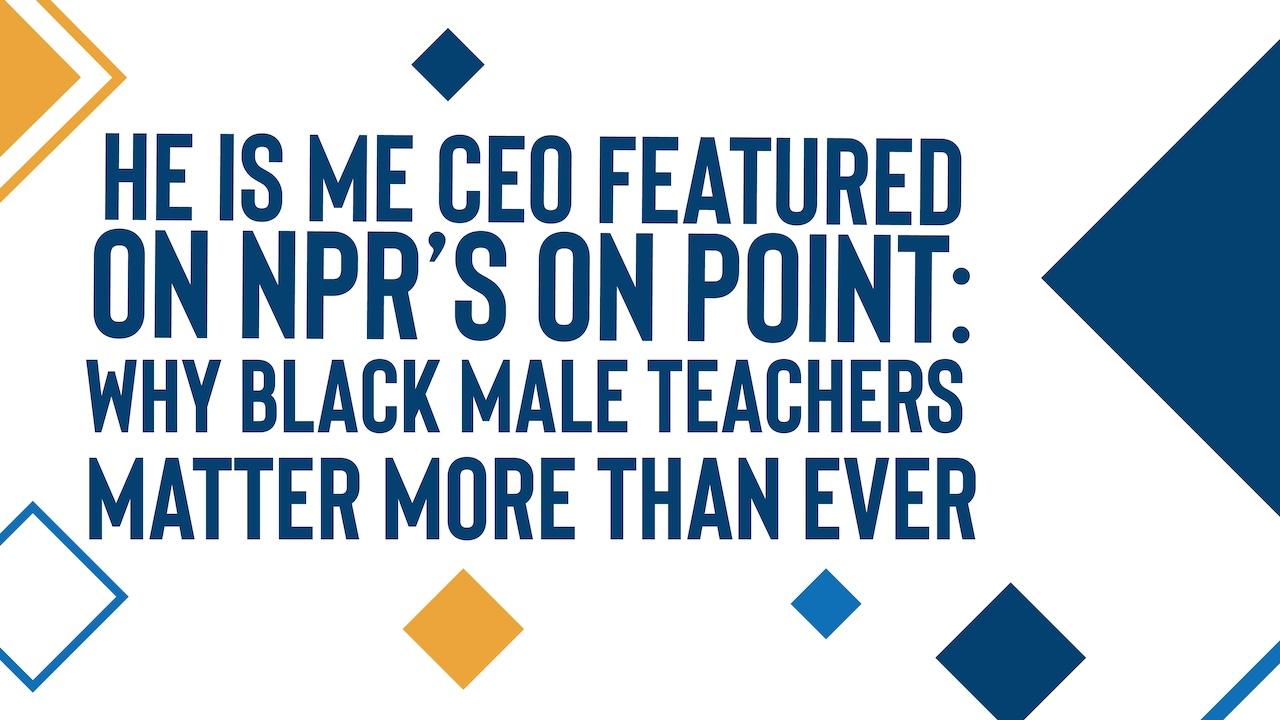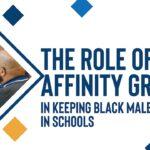- Robert Hendricks, III
- May 20, 2025
- Education, He Is Me Press
He is Me CEO Featured on NPR’s On Point: Why Black Male Teachers Matter More Than Ever
 In April 2025, NPR’s On Point aired a powerful five-part series, Falling Behind: The Miseducation of America’s Boys. Hosted by Meghna Chakrabarti, the series explored the ways in which boys—especially Black boys—are being underserved by American schools. Drawing on national data, classroom stories, and expert analysis, the series reinforced what He is Me Institute has long worked to address: schools often push Black boys out instead of drawing them in, and it’s time to change that.
In April 2025, NPR’s On Point aired a powerful five-part series, Falling Behind: The Miseducation of America’s Boys. Hosted by Meghna Chakrabarti, the series explored the ways in which boys—especially Black boys—are being underserved by American schools. Drawing on national data, classroom stories, and expert analysis, the series reinforced what He is Me Institute has long worked to address: schools often push Black boys out instead of drawing them in, and it’s time to change that.
Research shared throughout the series makes one thing clear: boys are lagging behind nearly every measure of educational success. They’re more likely to be suspended, held back, referred for special education, and to drop out before graduation. These patterns aren’t isolated—they’re nationwide, and they begin early. Rather than adapting to how boys learn, many schools interpret their behavior as misbehavior, often responding with punishment instead of support. The result is a system that quietly and consistently pushes boys, especially Black boys, away from academic success before they ever have a chance to reach it.
Robert J. Hendricks III, CEO of He is Me Institute, was featured on episode four of the series to offer a focused, local response to the national crisis. He is Me is a nonprofit committed to increasing the number of Black male teachers by creating structured, identity-affirming pathways into and through the profession. From early exposure in high school to coaching and community for classroom educators, the organization’s work tackles the very barriers On Point brought to light. Three, in particular, stand out: how schools misread boys’ behavior, how few Black men are recruited into teaching, and how isolating the profession can be once they arrive.
Misunderstanding Boys’ Behavior
Throughout the On Point series, a recurring theme is that schools often misinterpret boys’ behavior as defiance rather than developmental difference. Traits more commonly expressed by boys, such as the need for movement, physical activity, and competition, are frequently labeled as disruptive rather than seen as opportunities for engagement. Black boys are disproportionately punished for these behavioral differences with long-lasting effects. Although they make up a small percentage of the preschool population, Black boys account for 47% of all preschool suspensions nationwide. These early disciplinary actions are not just momentary punishments; they often mark the start of a longer trajectory of disengagement, underachievement, and diminished expectations.
He is Me Institute works to change how schools respond to Black boys by helping educators better understand developmental needs and the harm caused by biased discipline. One way the organization does this is through the He is Me Impact Summit, which brings together teachers, school leaders, and policy advocates to learn practical strategies for creating affirming classrooms. Sessions led by experienced educators and researchers help participants confront bias, rethink what “acceptable” behavior looks like, and center belonging. While increasing the number of Black male teachers remains a key factor, the Summit also equips all educators to better support Black boys. Beyond the event, He is Me elevates these practices through policy work, like supporting the Massachusetts Educator Diversity Act, and contributing to national media outlets including CNN and Good Morning America.
Lack of Male Teacher Mentors and Pathways
The On Point series highlights a critical issue: there are few clear or compelling pathways that lead Black boys and men into teaching. A study by the Brookings Institution found that fewer than 5% of Black male high school students expressed interest in becoming teachers. This is not because they lack the ability, but because the profession is rarely positioned as desirable, rewarding, or attainable. While the impact of Black male teachers is well documented, including reduced discipline referrals, higher academic achievement, and greater emotional stability among students, those outcomes remain out of reach when Black men aren’t in the classroom. And when they are, retention is an uphill battle: Black men are five times more likely to leave the profession within their first three years compared to their peers.
While the impact of Black male teachers is well documented, including reduced discipline referrals, higher academic achievement, and greater emotional stability among students, those outcomes remain out of reach when Black men aren’t in the classroom. And when they are, retention is an uphill battle: Black men are five times more likely to leave the profession within their first three years compared to their peers.
He is Me Institute addresses this systemic gap by offering aspiring Black male educators early and meaningful teaching experiences starting in high school and extending through college. Each summer, participants teach in classrooms and community-based settings, leading lessons for younger boys of color and developing their own skills as future educators. These experiences are paired with mentorship and coaching from experienced Black male teachers, allowing participants to explore the profession in real-world environments while receiving culturally grounded support. This work not only builds leadership, empathy, and instructional skill, but it also affirms their identities and deepens their belief that they belong in education. As a result, 100% of aspiring teachers report increased confidence in their ability to teach and lead in the classroom.
Feelings of Isolation and Identity Mismatch
Guests on the On Point series shined a light on the fact that Black male teachers frequently experience deep isolation in their schools. Research by Dr. Travis J. Bristol has found that Black men in education are often the only ones in their building who share their identity, leading to feelings of marginalization, disconnection, and a lack of institutional support. This social isolation undermines job satisfaction and is a key driver of attrition. Without culturally affirming environments or professional communities, many Black male teachers leave the profession within just a few years.
To counter this, He is Me Institute established the Black Male Teacher Network, an affinity space that is led by Black male educators, for Black male educators to center community, affirmation, and professional growth. Through in-person gatherings that bring together teachers from across schools and districts in Greater Boston, the Network fosters connection, leadership, and belonging. The result is powerful: 100% of participants report feeling more connected to other Black male teachers, a critical indicator of the role affinity spaces can play in reducing isolation, thus strengthening retention. By creating environments where Black men in education feel seen, supported, and part of something larger, they’re helping them lead and thrive for the long haul.
Where We Go from Here
On Point made visible what far too many families, educators, and young people have experienced firsthand: a school system that misunderstands boys, undervalues identity, and too often leaves Black boys behind. But understanding the problem is only the beginning. As this series spotlighted the national crisis, it also made space for organizations like He is Me to show that proven solutions already exist.
From changing how educators view discipline, to building real pathways for Black males into the profession-– and creating the community that helps them stay— He is Me Institute is not waiting for permission to reimagine what’s possible. Its programs are not side projects; they are system-level interventions led by people who know the stakes because they’ve lived them. And the message is clear: when we invest in Black male teachers, we’re investing in a school system that works better for everyone.
The work ahead is urgent, but not impossible. Boys need schools where they are understood. Black boys need classrooms led by those who see them fully. And Black male teachers need a profession that is ready to hold them, not push them out. The On Point series asked the right questions and He is Me is building the answers.
Listen here, or wherever you listen to podcasts.





